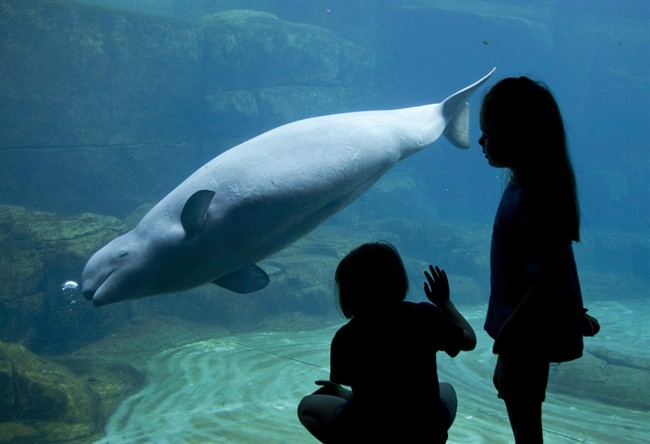VANCOUVER – As debate swirls around keeping whales in captivity, the Vancouver Aquarium is taking its beluga research back to the wild with a study to begin next week in the Arctic.

Behavioural ecologist Valeria Vergara is going to Cunningham Inlet, on Summerset Island about 800 kilometres north of the Arctic Circle, to listen in on the notoriously chatty cetaceans as they teach their calves to communicate.
“Belugas are incredibly vocal. They make hundreds of different sounds,” she said.
“Calves essentially … need to learn to speak beluga just like human babies need to learn to speak human language. They’re not born knowing their incredibly wide repertoire of sounds.”
For 12 years she has studied the mammals at the facility in Vancouver’s Stanley Park, documenting the whales’ social behaviours and communications.
Since the birth of Tuvoq, in 2002, aquarium staff have studied specifically the communication between cows and their calves.
Now Vergara is taking that research to the whales summer homes in the north.
Those homes are changing rapidly because of global climate change, said aquarium president John Nightingale.
Studies show the region is warming at twice the global average and the Northern Passage could be passable by ship in summer in as little as a decade, he said.
- B.C. child-killer’s attempt to keep new identity secret draws widespread outrage
- Inquest hears B.C. hostage was lying on her captor before fatal shooting
- ‘We’ve had to make a 180’: What Oregonians say they got wrong with decriminalization
- B.C. judge grants shared custody of family dog in landmark ruling
As the region has warmed, whale migration patterns have changed. The climate is altering their food sources and the species — and pathogens — around them.
Air-borne contaminants are being concentrated in the North and, as shipping traffic increases, so will marine noise pollution, Nightingale said.
“For beluga whales this changing environment could prove catastrophic,” he said.
The Vancouver Aquarium stopped acquiring cetaceans from the wild in 1996 but they do house rescued animals that cannot be returned to the ocean or animals that were born in captivity. The facility has two beluga whales, two porpoises and two dolphins.
Controversy re-emerged with the 2013 documentary “Blackfish,” about the 2010 death of veteran SeaWorld trainer Dawn Brancheau, killed by an orca. Vancouver Mayor Gregor Robertson fanned the flames of that debate last spring.
“My personal view is that the Vancouver Aquarium should begin to phase out the holding of whales and dolphins in captivity,” Robertson said in a statement.
The mayor did not, however, endorse a citywide referendum. The park board is expecting a report from staff next month on the issue.
Board Commissioner Aaron Jasper said the board is not considering any specific action but wants a report based on facts.
“People have strong passions about this on either side of the issue,” Jasper said Wednesday. “Let’s take a deep breath and all of us, in a respectful way, let’s work through this.”
For Nightingale and the aquarium, the stakes are high.
“Depending on what they do, if they say ‘Okay aquarium, you have to get rid of cetaceans,’ it would dramatically reduce this institution’s ability to contribute to conservation on Arctic issues,” he said.
“The discussions that happen in front of the viewing window with the public, or with visiting scientists, or with policy makers, it’s a different kind of discussion when you’re standing right there looking at it, talking not about the whales here in the aquarium but the thousands of them that are living out in the wild and whose lives are being really impacted,” Nightingale said.



Comments